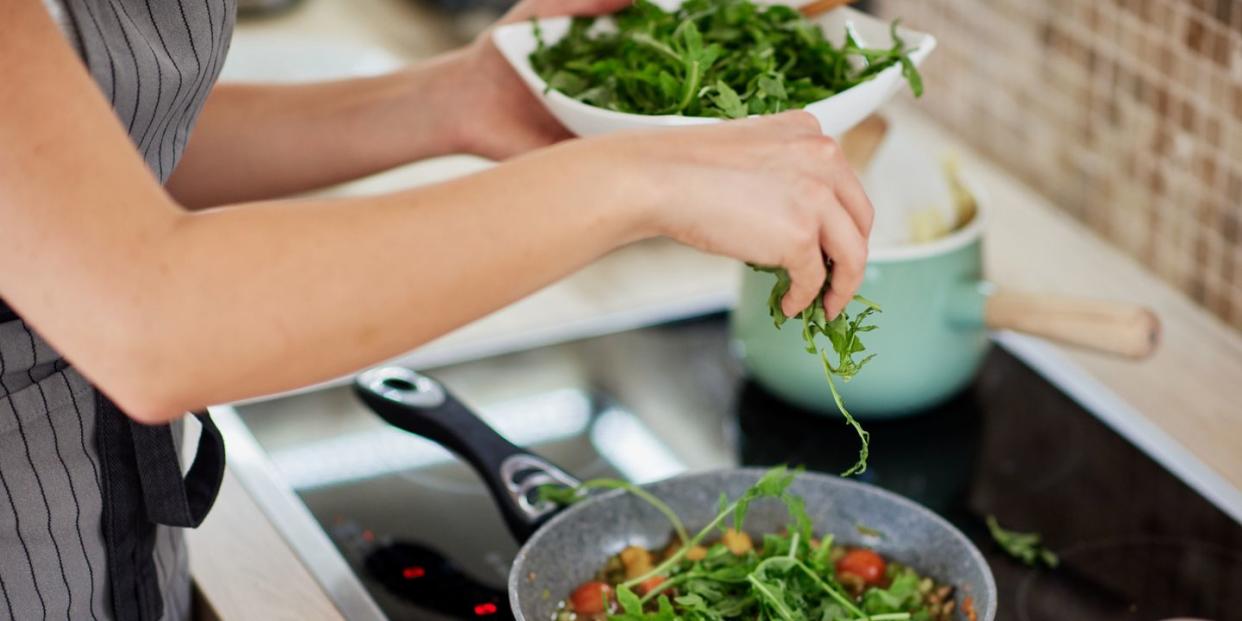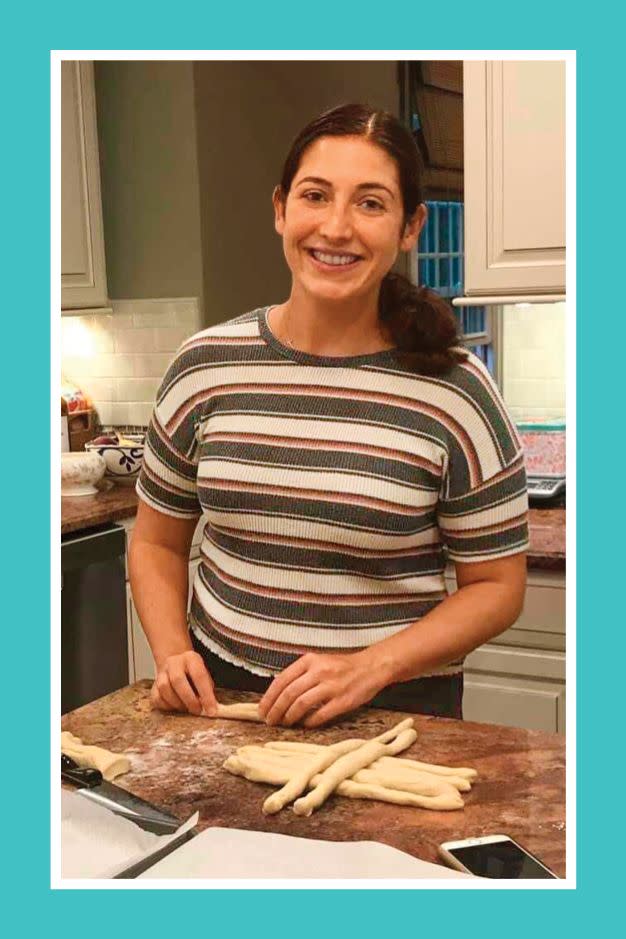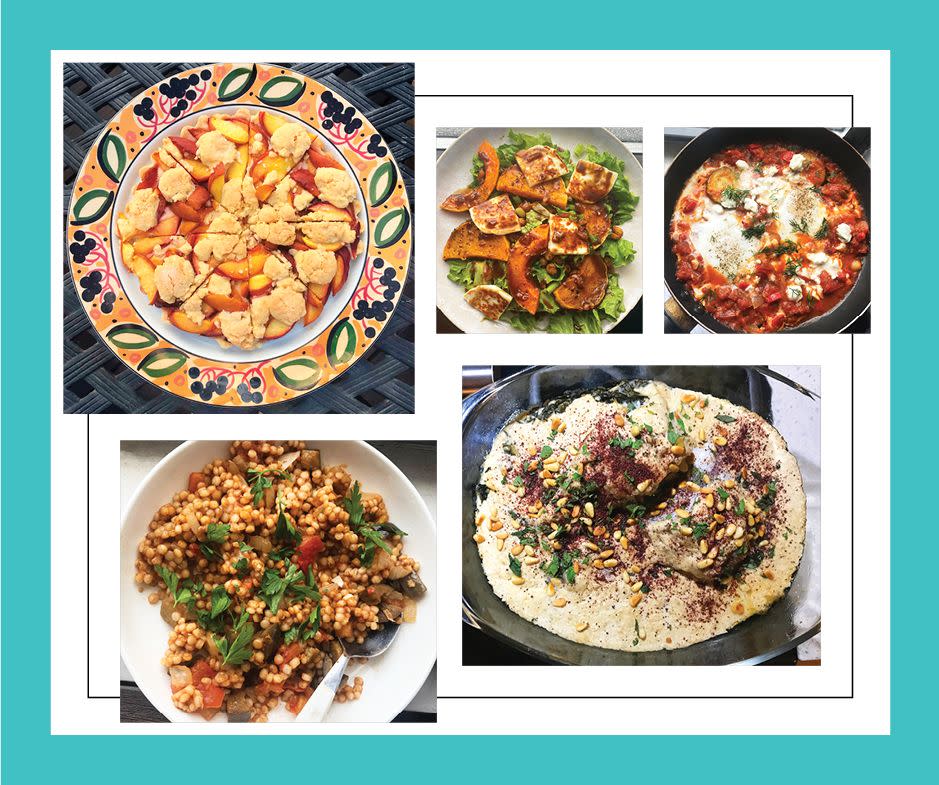My New Year’s Resolution Wasn’t About Weight Loss This Year

"Hearst Magazines and Yahoo may earn commission or revenue on some items through the links below."
My brain works the way it does today because I grew up as a chubby kid in the midst of an unforgiving ’90s diet culture. I was on diets before I probably knew what dieting even meant, and I was hyper aware of my body size and the number on the scale before I was packing my own lunch. Unsurprisingly, this led to years of trying every diet on the internet, scouring the bookshelves at bookstores for the answers to my scale-related woes, and naturally, making a New Year’s resolution year after year to finally drop the weight I had been carrying all my life. Until one year, I didn’t.
Why New Year’s resolutions don’t work
A New Year’s resolution to drop pounds isn’t a goal that’s unique to me. In a survey conducted by the market research specialists Ipsos, of those who planned a New Year’s resolution, 42% aimed to lose weight.
“Pressure to lose weight may be on the forefront of people’s minds this time of year in part because of advertising and special sales from the entire weight loss industry,” says Kristen Farrell-Turner, Ph.D., a psychologist and educator at Pritikin Longevity Center. “This pressure also may stem in part from the reality that, for many people, the weeks from Thanksgiving until New Year’s Day generally involve increased caloric intake, unhealthy food, and alcohol. So people might see New Year’s resolutions as a way to undo the damage caused by the past few weeks.”
Additionally, people often don’t realize weight loss is more than just counting calories and going to the gym. Rachel Begun, M.S., R.D.N., leadership development coach and health nutrition expert says, “When we want to make change for ourselves, we often have competing commitments or values that prevent us from making the very change we are trying to make.”
For example, if a woman is trying to lose weight but baking and hosting friends is important to her, this may undermine the desire to lose weight. “Taking away baking goes against how she shows people love, which is a priority value to her. You can begin to see how her very identity is wrapped up in the reason why it’s so difficult for her to lose weight,” Begun explains.
When we aren’t able to achieve unrealistic goals we set for ourselves, it can have a major impact on our self-worth. “If you view yourself as a failure, now believe that you can’t make these changes, or hold yourself to unreasonable standards, your self-efficacy, self-esteem, mood, and other aspects of mental health and functioning may all suffer,” Farrell-Turner adds.
Learning to make a realistic New Year’s resolution
I was always an avid home cook and meal planner, but during the pandemic, I really leaned into more complicated recipes to pass the time and keep myself busy. One night when flipping through one of my many cookbooks, I opened up Sababa: Fresh, Sunny Flavors From My Israeli Kitchen by Adeena Sussman, a chef you may know from her collaborations with model and cookbook author Chrissy Teigen. As I flipped through the photos of melted green cabbage, lentils with crispy leeks and fennel, and homemade hummus, I realized that I wanted to make everything on these stunning pages. And so the journey began.
I decided that instead of depriving myself with another year of January Whole30 (circa New Year’s 2019) or pressuring myself to exercise every day and shed weight during a global pandemic, I was going to do the exact opposite this year. I was going to eat. And I was going to eat well.

In 2021, I broke up with dieting for good and instead chose to focus my efforts in the new year on something more fulfilling, creative, achievable, and downright delicious. I set out to cook through one of the cookbooks in my collection–and it’s changed the way I see New Year’s resolutions, dieting, and honestly, myself when it comes to how I’ve treated my body for all these years.
When I explained my resolution to Caroline Adams Miller, M.A.P.P., speaker, educator, and author of Creating Your Best Life: The Ultimate Life Guide, she agreed that it was a really great practice for someone in my position. “It’s great goal setting training. Not all goals and dreams are about changing the world. A lot of time it’s about giving ourselves a set of skills and a sense of confidence,” she told me. “There’s a clear outcome, something to enjoy, and you can see success or failure.”
Miller added that this particular goal was great for me because it was like an “emotional reset,” and though the goal involved cooking, it wasn’t really about food or eating in a weight-loss mentality. “For someone who’s had a weight loss goal, it has made food your friend,” she said. I wholeheartedly agreed.
Because I’m just one person (who sometimes feeds my roommate, boyfriend, friends, and parents when they’re around), I figured an appropriate, achievable plan was to cook at least one recipe a week from the book. Some weeks I would make multiple recipes because I had the time, other weeks I gave myself wiggle room to make something super simple or skip a week if I was on vacation. As of writing this, I’ve counted 55 recipes I’ve made (including more loaves of honey and olive oil challah than I can count), with two more recipes left on my docket for the remainder of the year. And to keep myself accountable, I would share these all to my food-focused personal Instagram account, saving the photos to highlights and sometimes to the feed when my unforgiving apartment lighting allowed for a worthy shot.
What I learned from changing up my New Year’s resolution
It all began with what I still stand behind as my favorite meal that I cooked for myself and my boyfriend on New Year’s eve 2020. After much deliberation about what I would make to kick off the new year, and my new resolution, we settled on jeweled rice, sea bass baked in cardamom yogurt sauce with mint, sumac, and pine nuts, and citrus salad as per Sababa’s recommendation. That meal was a serious knockout spread, and I’ve been cooking ridiculously delicious dishes ever since. Here are just some of the many lessons I learned throughout this last year of cooking my way through Sababa (this resolution could work with any cookbook you love!) and breaking up with weight loss goals.
Set different kinds of goals
There’s so much pressure during the new year to set goals that change us, but for once I set a goal just to enhance myself. There’s nothing wrong with setting goals to drop the weight, get that higher position at work, or run that marathon. But sometimes it’s a nice change to set a goal just for fun.
Miller says that there are a slew of different types of goals you can set for yourself, whether that’s exploring a new career path, trying to write a book, or dancing at events without feeling self-conscience. “When you pursue and achieve a goal that’s important to you, it builds self-efficacy. You have the confidence to tackle other things in life,” she says. “When you build self-efficacy, you begin to test harder and harder goals and you begin to learn that you know you’ve been resilient in life before.”
While cooking through Sababa, I experimented with ingredients I hadn’t ever cooked with before, like cottage cheese (which I always thought I hated) in the broccoli cottage cheese pancakes. I also used ingredients I thought were too challenging, like sushi-grade tuna in the (seriously, drool-worthy) crudo with cherries. And I didn’t even mention the thrill I got trying to preserve lemons for the first time (spoiler: do it) or making the Middle-eastern mango curry sauce called Amba from scratch and putting it on literally everything I cooked for weeks because it was just that good. This goal allowed me to learn so much about myself and cooking, and challenged me every week to achieve mini goals.

Fresh ingredients matter more than calories.
I’ve always been someone who cooks with in-season foods and shops at my local farmers’ market when I can, but I never truly understood how much impact the quality of my ingredients could make on a recipe. In a very (to me) tragic situation, where I was forced to buy apricots a little too late in the season off a street cart in New York City for a recipe, I had to toss a completely inedible tray of thyme roasted apricots with goat cheese. I’ll never make that mistake again.
But on the flip side, a pot full of long-cooked romano beans with tomato and onion left me dreaming about an essentially three-ingredient recipe months later. I went to a farmers’ market in my city and chatted with the farmer about the best way to prepare and use the Romano beans (that I had never cooked with before, I might add), and I sliced up colorful heirloom tomatoes that were as lusciously juicy as they were candy sweet. The lesson was learned: no matter how great a recipe is, bad ingredients yield bad food. Great ingredients yield phenomenal food.
Additionally, I found that allowing myself the luxury of forgetting the calorie count and just eating good and real food, I began to slowly chip away at years of anxiety around foods I had never dealt with before (more on that next).
There’s more to life than the number on the scale.
Throughout this process, I ate foods that had always been off-limits to me and nixed the guilt I had always associated with certain ingredients...and at the end of the day, I was happy. I made foods like roasted cherry tomatoes and labneh on pappardelle, homemade bagels, and I even made my very own cheesecake from scratch (easily my greatest accomplishment of the year). What I found is that by allowing myself to not set rigid rules and goals around the foods that I eat and the size of my body, I didn’t feel the need to eat three pieces of cake. In fact, because I know how hard I worked on it, I savored it for days.
Suddenly food didn’t have quite the same power over me, and I realized that all this time I had been putting pressure on myself to shrink my body to a size it just didn’t want to be at. And though I still struggle with my body image (you don’t lose 26 years of that headspace so easily), I definitely moved in the direction of becoming more comfortable with how I look and less stressed about the food on my plate.
Note: to supplement my experience, I also read the non-diet book Intuitive Eating, which outlines steps to take to rid yourself of diet culture and the emotional toll we take on to make our bodies smaller. Though this wasn’t necessarily part of the New Year’s resolution, it was a great addition to my learning and I would highly recommend it.
How to set realistic New Year’s resolutions for yourself.
Now, I’ve shared my story with you and you’re probably thinking, “Ok, now what?” If you’re interested in making a New Year’s resolution that breaks away from weight loss, follow these expert tips for creating a game plan come January 1.
Find your motivation. It may seem obvious, but the first thing you need to do when setting a goal is to find the motivation, says Angeleena May, a licensed mental health counselor and executive director of A Mission for Michael Healthcare. “When we set a goal, really step back and take a look at our habits,” she says. “See what’s been a barrier to meeting your goals in the past and understand the motivation behind those barriers.” For example, if you set a goal to lose weight, be sure you understand what the motivation is behind that goal. Is it about actually wanting the number on the scale to be less, or is it tied to self-acceptance? In the latter, focusing on positive affirmation to support yourself instead of just the number on the scale can be beneficial, May suggests.
Set yourself up for success. Take a moment to think about the barriers you have that have stopped you in the past to achieve your goals. For example, if you find you want to go to the gym more, but you’re not already going to the gym, ask yourself what you can do to ensure you have what you need to make that happen. It’s also essential to surround yourself with supportive people who will encourage your changes, Miller says. “Share your goals with people who are curious and enthusiastic about it. People who want to know more and want to support you. If that’s not their response, then this person likely will stop you in your tracks with their lack of support,” she says.
Then, plan. Once you know your “why,” May says it’s important to support yourself so that you can start seeing change happen. “Setting SMART goals (specific, measurable, achievable, relevant, and time-bound) is really great because they identify the logistics of a goal that’s measurable,” she notes. Sometimes this will mean setting smaller goals for yourself to achieve a larger goal. In my case, I wanted to cook one recipe per week instead of setting a goal of cooking 100 recipes throughout the year without a clear plan of how I was going to do that. “Success begets success, and reaching any goal often requires changing multiple behaviors. If we break the goal down into smaller parts, it can be easier to work on one behavior at a time. Once a new behavior has become stabilized, then a second behavior can be introduced to work on,” Begun says.
Create a habit change. Find what works best for you to encourage following your plan for the long term, this may mean connecting your goal to something you already do every day to form a habit, May says. For example, if your goal is to drink more water, make a rule for yourself that every time you walk to the printer (or do another regular activity) you have to take a sip of water. This will slowly help incorporate drinking more water into your everyday routine.
Finally, stay accountable. Grab a notebook, start a Facebook page, or call a friend to update them for the best success. “You have to have a target you can see and a way to gauge progress,” Miller says. “People that are accountable to other people are far more likely to achieve their goals.”
You Might Also Like